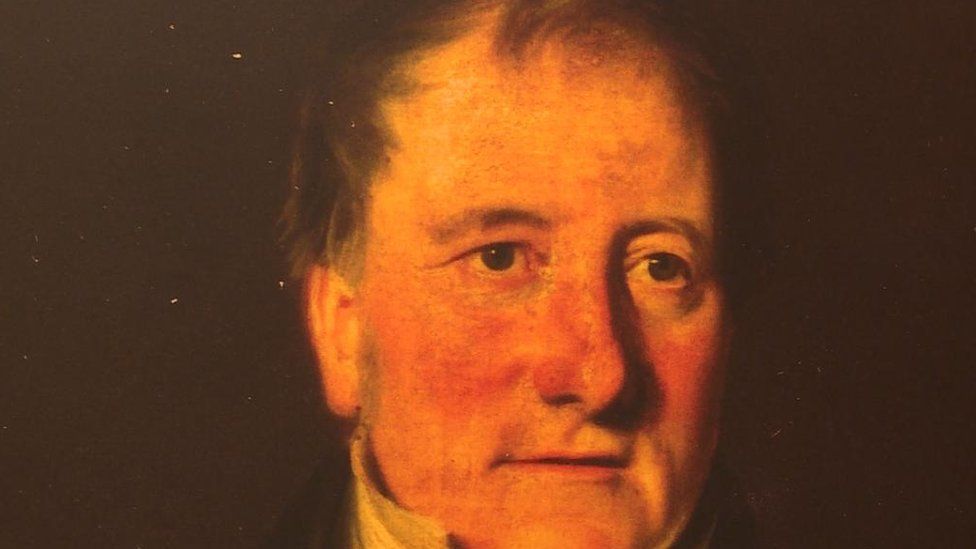Savings bank founder Henry Duncan play premieres in Ruthwell
- Published

A play on the life of the Dumfriesshire minister who started the world's first savings bank has been premiered in the church where he preached.
Henry Duncan worked in a commercial bank before taking up the ministry in Ruthwell Parish at the turn of the 19th Century.
He started his "penny bank" to give parishioners access to savings and interest for the first time.
The model was soon adopted around the globe.
In 19th Century rural Scotland personal banking was beyond the means of most.
Commercial banks demanded £10 to open an account - unimaginable savings for farm workers and domestic servants paid a fraction of that per year.
In Ruthwell, a country parish 10 miles south east of Dumfries, the kirk minister Henry Duncan decided he could change that.
He had worked for three years for a bank in Liverpool before turning to the ministry.
The cottage where he opened his savings bank - initially for one hour a week on a Thursday evening - is maintained today as a museum by the TSB.
Curator Mhairi Hastings said: "The first account here at Ruthwell you could open with sixpence.
"That brought it into the affordability for ordinary folk like farm workers and servants.
"It gave them the security of somewhere to put their money so they didn't have to hide it somewhere around their house - under their bed or in their sock drawer."
Ms Hastings said there was another benefit of using the savings bank which proved popular.
"It also gave them access to interest because Henry took the money from Ruthwell and redeposited into a commercial bank," she said.
"He got between 5% and 6% interest from them and he paid out between 4% and 5%.
"So, all of a sudden somebody in Scotland was giving away free money - the word spread very quickly as you could imagine."
The model created by Duncan was copied quickly around the UK and, before long, around the world.
Who was Henry Duncan?
- Born in 1774 in the manse at Lochrutton, near Dumfries
- Ordained as minister of Ruthwell Church in 1799
- In 1810, he opened "an economical bank for the savings of the industrious"
- Within five years, savings banks based on Duncan's model were operating throughout the UK
- The movement spread to 109 organisations in 92 countries
- Founded and edited the Dumfries and Galloway Courier
- Became Moderator of the General Assembly of the Church of Scotland
- Presented first scientific paper on fossil footprints found in Corncockle Quarry to the Royal Society of Edinburgh in 1828
- Restored the medieval Ruthwell Cross
- Died in 1846
Source: Savings Banks Museum
Last year, Dave Dewar from Dunoon chanced upon the museum.
He runs an historical theatre group called Cultural Connections and was so inspired by Duncan and his many life achievements that he wrote a play.
"He's an incredible man and he's largely an unsung hero - people don't know much about him," he said.
"He didn't just start the savings bank movement worldwide. He was a geologist, an artist and a newspaper publisher - he owned one of the local newspapers here.
"He was, as they say in Scotland, a man of many parts."
Henry Duncan, The Banker Who Cared premiered on Thursday night in Ruthwell church where Duncan preached for more than four decades.
"This is where it all started, in this church, so it is an honour really to do it in Henry Duncan's church," Mr Dewar said.
- Published9 September 2013